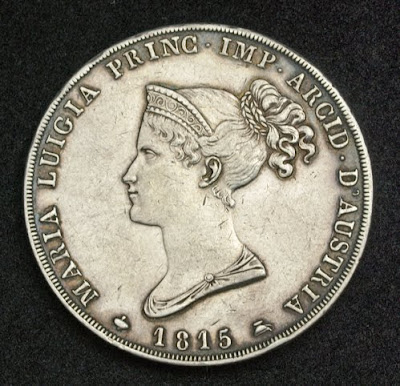 |
| Italian States Coins Parma 5 Lire Silver Coin, Marie Louise of Austria |
 |
| Coins of Italy - 5 Parman Lire Silver Coin |
Italian coins, Italian Coinage, Italian silver coins, Numismatic Collection, Coins of Italy best silver coins for investment.
Obverse: Diademed bust of Marie Louise of Austria as Duchess of Parma, Piacenza and Guastalla left.
Legend: MARIA LUIGIA PRINC. IMP. ARCID. D' AUSTRIA (privy mark) 1815 M (privy mark)
Reverse: Crowned coat of arms of the duchy within collar of the Order of Saint George.
Legend: PER LA GR . DI DIO DUCH . DI PARMA PIAC . E GUAST .
Edge: DIRIGE ME DOMINE
Mintage: 93,000 pcs.
Mint Place: Milan
Reference: Davenport 204, CNI IX74 / Table XXXVI/5, Pagani 5, Varesi 5, KM-C#30. RR!
Weight: 24.94 gram Silver (.900)
Diameter: 38 mm
Parman lira
The Parman lira was the distinct currency of Parma before 1802 and again from 1815 to 1859.
First lira
The Duchy of Parma issued its own currency until it was annexed to France in 1802. This lira was subdivided into 20 soldi (singular: soldo), each of 12 denari (singular: denaro), with the sesino worth 6 denari and the ducato was worth 7 lire. The currency was replaced by the French franc.
Second lira
After the re-establishment of Parman independence, a national currency was introduced in 1815. Also called the lira, it was subdivided into 20 soldi or 100 centesimi. However, this lira was equal to the French franc and the Sardinian lira, and it circulated alongside the latter. It weighed 5 grams, and had a purity of 9/10 of silver. Since 1860, Parma has used the equivalent Italian lira.
In 1815, silver coins were introduced in denominations of 5 and 10 soldi, 1, 2 and 5 lire, together with gold 20 and 40 lire. Copper 1, 3 and 5 centesimi were added in 1830. All coins until the death of Marie Louise were minted by the Austrian State in Milan. When the House of Bourbon rose to the throne in 1847, the Parman mint was re-opened.
Marie Louise, Duchess of Parma
Marie Louise of Austria (Maria Ludovica Leopoldina Franziska Therese Josepha Lucia von Habsburg-Lothringen; 12 December 1791 – 17 December 1847) was the second wife of Napoleon I, Emperor of the French and later Duchess of Parma. As such, she was Empress of the French from 1810 to 1814, and subsequently ruler of Parma, Piacenza and Guastalla from 1814 until her death.
As the eldest child of Habsburg Emperor Francis I of Austria and his second wife, Maria Theresa of Naples and Sicily, Marie Louise grew up during a period of continuous conflict between Austria and revolutionary France. A series of military defeats at the hands of Napoleon Bonaparte had inflicted a heavy human toll on Austria and led Francis to dissolve the Holy Roman Empire. The end of the War of the Fifth Coalition resulted in the marriage of Napoleon and Marie Louise in 1810, which ushered in a brief period of peace and friendship between Austria and the French Empire. Marie Louise dutifully agreed to the marriage despite being raised to despise France. She was an obedient wife and was adored by Napoleon, who had been eager to marry a member of one of Europe's leading royal houses to cement his relatively young Empire. With Napoleon, she bore a son, styled the King of Rome at birth, later Duke of Reichstaedt, who briefly succeeded him as Napoleon II.
Napoleon's fortunes began to change dramatically in 1812 after his failed invasion of Russia. The European powers, including Austria, resumed hostilities towards France in the War of the Sixth Coalition, which ended with the abdication of Napoleon and his exile to Elba. The 1814 Treaty of Fontainebleau handed over the Duchies of Parma, Piacenza and Guastalla to Empress Marie Louise. She ruled the duchies until her death.
Marie Louise married morganatically twice after Napoleon's death in 1821. Her second husband was Count Adam Albert von Neipperg (married 1821), an equerry she met in 1814. She and Neipperg had three children. After Neipperg's death, she married Count Charles René de Bombelles, her chamberlain, in 1834. Marie Louise died in Parma in 1847.